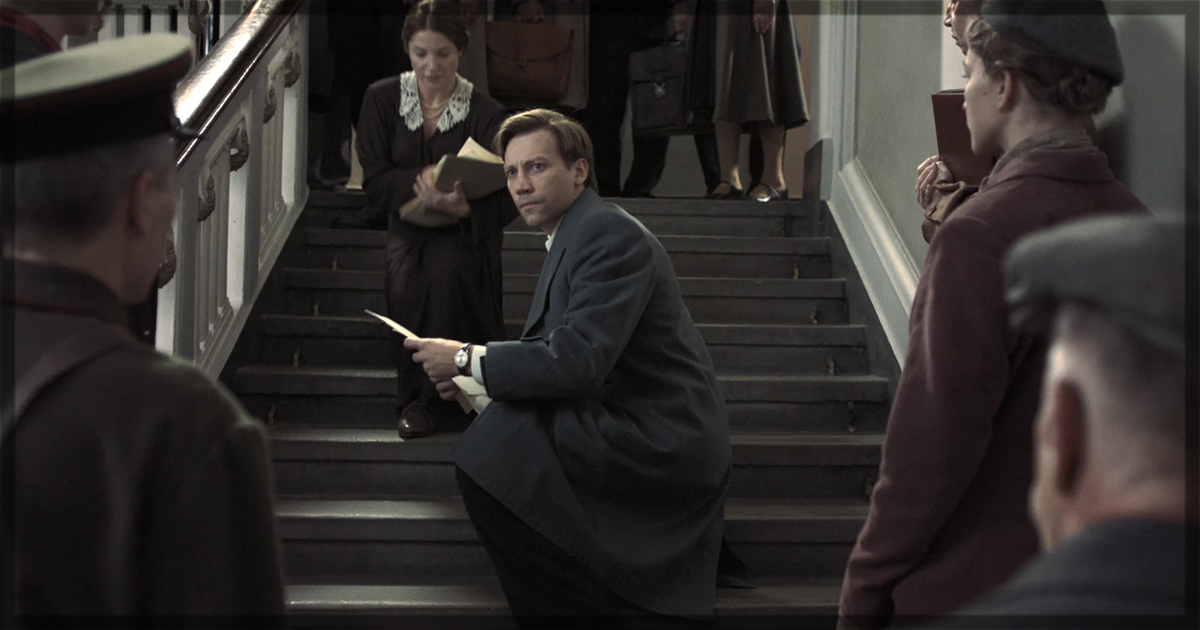The influence of The Zone of Interest is heavy on Two Prosecutors, a story about Stalinist terror that works as well as it does thanks to its discretion. It’s less about the sound design and more the enveloping knowledge of all the horrors out of frame. Anything that tried to show the full scope of the terror in the former USSR in the 1930s would be so abominably bleak as to be unwatchable. Instead the thoughtful pace and deliberate minimisation of action is to enable us to reflect on what we are not seeing. A lot of people will resist this movie’s power but Two Prosecutors is a mouse that roars.
A prisoner, so weak he can barely walk, is locked in a room which contains a small woodstove, a little stool and some kindling. The bag he can barely carry is full of letters from his fellow prisoners, which the warden instructs him to burn without reading. To that end he is supplied with a single match and ordered to return the matchbox. The moment he is alone the prisoner begins to read the letters, folded into triangles, which are pleas for help and justice. But one letter stands out: it has been written, on the cardboard from a roll of toilet paper pressed flat, in blood. It is a plea for someone from the local prosecutor’s office to come visit him in his specific cell as he has vital information for the government.
This note somehow reaches the new prosecutor, Kornev (Alexander Kuznetsov), who knows how much danger the note puts him in but is determined to do his job all the same. He shows up outside the prison gates, by which a group of women wait, in silence. He is shown through many locked doors and into an office, where he explains his purpose and is made to wait. And wait. But eventually his persistence (or stupidity) wins and he is shown in to the cell.
When a woman spills a folder of papers down a staircase, why does everyone freeze in place instead of helping her gather them up? Why are some men on a train so willing to share their vodka? How do you live when your every little gesture puts you under suspicion, and every detail of your life in the world monitored for purposes hidden from you?
Well. As Stepniak (Alexander Filippenko) knows, eventually you are removed from the world. After establishing first that Kornev is who he says he is and secondly that he has no living family, Stepniak slowly moves out of view of the peephole to display the physical proof of the torture he is enduring. Clearly the local branch of the NKVD (the precusor of the KGB) has been infiltrated by the enemies of the USSR, because there is no way a stand-up guy like Stalin would allow for torture to be done in his name. So there’s only one thing to do: Kornev must leave for Moscow on the next train and report this news as high up the chain as possible.
So he does. Despite all the bureaucracy and all the odds, Kornev is granted an audience with the attorney general for the whole of the USSR: Vyshynsky (Anatoly Beliy), a real life person who is now mostly remembered outside of Russia for saying “Give me a man and I’ll find the crime.” As the consequences of this extraordinary act unfurl, director Sergei Loznitsa (who adapted a novella by Georgy Demidov) allows us time to reflect on just what it means to be this brave. For one part, Oleg Mutu’s beautiful cinematographer is very composed and somehow even through its lighting very contained. For another, the focus is on the waiting even in the most crowded spaces. This happens in the most awful kind of silence, the one where you are on edge waiting for something bad to happen. Kornev mostly naps, though on the train he is repeatedly poked awake with the wooden leg belonging to a war veteran (also Alexander Filippenko). The veteran is determined to maximise his captive audience to hear about the greatest day of his life: when he came face to face with Lenin.
Mr. Loznitsa is a Ukrainian of Belarussian origins who has had a bad time recently as he has refused to join various boycotts of Russian films in solidarity with Russian filmmakers who also oppose the current war. Mr. Kuznetsov, himself a Russian, has spoken out against the war. Mr. Filippenko, an actor of such renown in Russia he has received the highest civilian honors the nation has to offer, has been so outspoken against the war he now lives in Lithuania.
Two Prosecutors makes the unwatchable watchable. It gives us something no one wants to see in ways we can stand to look at, and it gives us the space to consider what it means. Its message is not a lesson humanity should keep needing to relearn. But here we are. Everyone working on this movie has made a very brave personal and professional choice. Those of us from more previously privileged countries can appreciate their efforts with the curdling realisation that such horrors are now happening at home. Anything more than this would have been too much.
Two Prosecutors recently played at the Cannes Film Festival.
Learn more about the film at the Cannes site for the title.
You might also like…
‘Mission: Impossible – The Final Reckoning’ Movie Review: So Excellent It’s Hard to Believe


